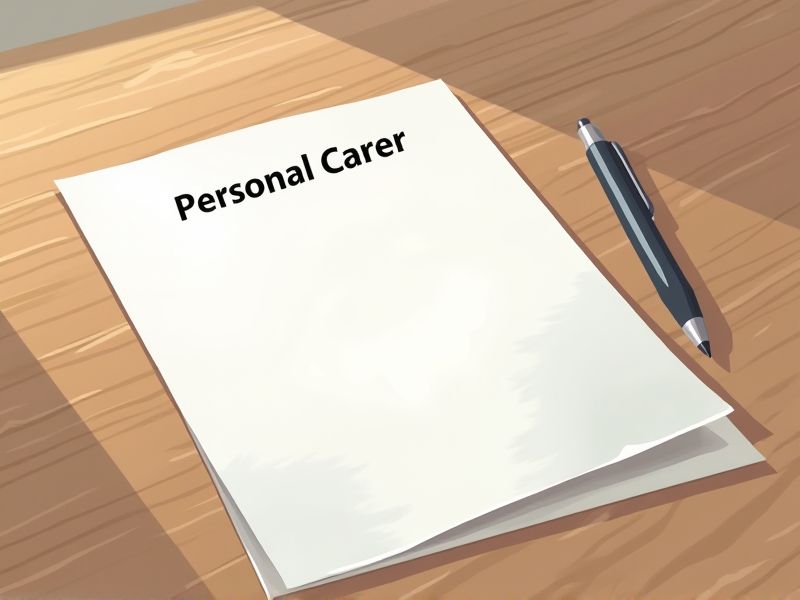
The demand for personal carers is increasing due to an aging population and a rise in chronic health conditions. Certifications ensure carers possess the necessary skills and knowledge to provide quality care and support. They also establish a standardized level of competency, enhancing trust among clients and employers. Some essential certifications you may require as a Personal Carer include the following.
Certified Nursing Assistant (CNA)
Certified Nursing Assistants (CNAs) are essential for personal care due to their specialized training in basic patient care, enhancing the overall quality of service. They help improve the patient's daily life by monitoring vital signs and assisting with essential activities like bathing and dressing. CNAs provide emotional support, improving the emotional well-being of patients dealing with illness or recovery. Their presence ensures a safer environment, as they can quickly respond to medical situations and ensure adherence to healthcare plans.
Home Health Aide (HHA) Certification
Home Health Aide (HHA) Certification ensures that personal carers have received standardized training, which increases the level of care provided to clients. It verifies that the caregiver understands essential medical knowledge and caregiving techniques, which reduces the risk of errors and enhances patient safety. Certification often leads to better job opportunities and pay, which attracts more skilled individuals to the field. Regulation through certification also reassures families and healthcare providers about the competency and reliability of the personal carer.
Personal Care Aide (PCA) Certification
Personal care aides need certification to ensure they possess the necessary skills and knowledge to provide quality care. Certification validates their understanding of health and safety protocols crucial for the well-being of clients. It can also enhance employment opportunities, as many agencies and families prefer certified individuals. Certification programs often offer ongoing education, keeping aides updated on best practices and regulatory changes.
CPR and First Aid Certification
Personal carers often face medical emergencies, where CPR and first aid skills can be life-saving. Certification ensures that carers have the necessary knowledge and skills to respond effectively in crisis situations. This training enhances the safety and well-being of clients, especially those with medical vulnerabilities. Employers often prioritize hiring certified individuals, ensuring a higher standard of care for their clients.
Medication Administration Certification
Medication Administration Certification is necessary for personal carers to ensure the safe and accurate delivery of medications to clients. This certification reduces the risk of medication errors, which can lead to adverse health outcomes. It also empowers carers with the knowledge to recognize side effects and respond appropriately. Regulatory bodies often require this certification to ensure a standardized level of care is maintained across the healthcare industry.
Mental Health First Aid Certification
Mental Health First Aid Certification equips personal carers with the skills to recognize early signs of mental health issues, leading to timely intervention. This certification provides them with the knowledge to effectively communicate and de-escalate potential crises, ensuring a safer environment for both the carer and those in their care. Personal carers with this training can better support individuals experiencing mental health challenges, fostering improved recovery outcomes. The certification also enhances the carer's professional capability, increasing their value in healthcare settings where mental health issues are prevalent.
Dementia Care Certification
Dementia care certification equips personal carers with specialized knowledge to handle complex behavioral challenges effectively. With certified training, carers can implement evidence-based strategies, which reduces the risk of adverse incidents and enhances patient safety. Certification ensures carers understand and respect the diverse needs of individuals with dementia, leading to improved communication and caregiving outcomes. As healthcare standards rise, certified carers meet regulatory requirements, fostering trust among families seeking competent care for their loved ones.
Palliative Care Certification
Palliative care certification equips personal carers with specialized skills needed to manage patients with serious illnesses, leading to improved quality of care. When carers have certification, they demonstrate a validated understanding of palliative care principles, which can increase trust and reassurance for both patients and their families. The comprehensive training involved in certification enhances a caregiver's ability to address emotional and psychological aspects of end-of-life care, reducing patient distress. Having certified carers often leads to better outcomes, reflected in higher patient satisfaction and potentially fewer hospital readmissions.
Infection Control Certification
Infection control certification equips personal carers with essential knowledge to prevent and manage infectious diseases, reducing transmission risks. Without proper training, carers might inadvertently contribute to the spread of infections among vulnerable populations, increasing healthcare burdens. Accredited certification ensures carers adhere to standardized protocols, enhancing patient trust and safety in care facilities. The growing complexity of infectious pathogens necessitates continuous education, ensuring carers remain updated on effective control strategies.
Nonviolent Crisis Intervention Certification
Nonviolent Crisis Intervention Certification equips personal carers with techniques to de-escalate potentially volatile situations, ensuring the safety of both the carer and the individual receiving care. When carers implement these strategies effectively, they reduce the likelihood of physical confrontations, which can lead to injuries or increased anxiety in vulnerable individuals. The certification enhances the carer's confidence in managing challenging behaviors with empathy and composure. Certified carers are more likely to improve their professional standards and foster a trusting environment, which is essential for effective caregiving relationships.
Summary
By obtaining certifications as a Personal Carer, you can expect enhanced career opportunities due to recognized qualifications. This typically leads to increased trust from clients and employers, which may result in higher job security and potential for salary growth. Certifications often enable a deeper understanding of care practices, improving the quality of service provided. Such qualifications not only expand your skill set but also elevate your professional reputation within the industry.
